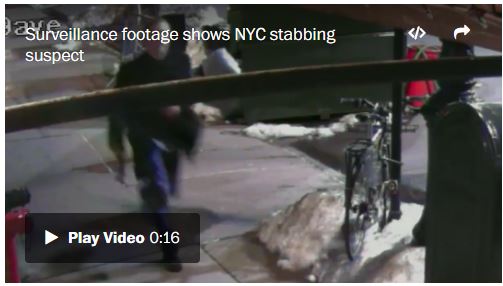Prosecutors in New York have upgraded the charges against a white man who police say admitted to fatally stabbing a black man in a burst of racial hatred, indicting him on two new charges of murder as an act of terrorism.
Police say James H. Jackson, a 28-year-old from Baltimore, admitted to traveling to New York specifically to target and kill black men. Once in the city, they say, he “stalked numerous potential victims” before confronting Timothy Caughman, 66, and fatally stabbing him with a sword in what Jackson intended to be the first of many attacks.
Accounts from police and Jackson’s statements to the media detailed a long-standing, visceral hatred of black people that culminated in his decision this month to board a Bolt Bus to Manhattan and attack black men where he could gain the most attention.
“James Jackson prowled the streets of New York for three days in search of a black person to assassinate in order to launch a campaign of terrorism against our Manhattan community and the values we celebrate,” Cyrus R. Vance Jr., the district attorney for Manhattan, said Monday in a statement.
[Fatal stabbing in New York was ‘practice’ for more attacks on black men, police say]
Jackson was indicted in New York State Supreme Court on one count of first-degree murder and one count of second-degree murder, both as acts of terrorism. Jackson had been charged last week with murder as a hate crime and three counts of criminally possessing a weapon.
His attorney declined to comment on the additional charges Monday.
The new charges, announced Monday afternoon by Vance, came nearly a week after Caughman was killed. Police say he was stabbed repeatedly, went to the authorities for help and was taken to a nearby hospital, where he died.
Vance decried the attack, saying Jackson “acted on his plan, randomly selecting a beloved New Yorker solely on the basis of his skin color, and stabbing him repeatedly and publicly on a midtown street corner.”
[White man traveled to New York to kill black men and ‘make a statement,’ police say]
Jackson, an Army veteran, turned himself in to police a little more than a day later, walking into a substation and telling officers that he was the person they were seeking, Assistant Police Chief William Aubry said at a news briefing last week.
Police said Jackson left no doubt about what motivated his attack, saying in a complaint filed last week that he “was angered by black men mixing with white women.” In an interview with the New York Daily News published Sunday, Jackson said he hoped his attack would make white women decide not to enter romantic relationships with black men.
In the complaint, police said Jackson acknowledged targeting Caughman because of his race. They also said that Jackson intended to carry out attacks in a high-profile place in order to get the widest possible audience.
“Jackson regarded the killing as practice prior to going to Times Square to kill additional black men,” the complaint stated.
But Jackson said he felt regret after the attack, telling the Daily News that he “didn’t know was elderly.” Jackson told the newspaper that he would have rather killed “a young thug” or “a successful older black man” with blond women.
On Monday, Jackson was in court for a hearing that included the new counts. Childhood friends of Caughman were in attendance as well.
“Tim Caughman did not deserve to die like that,” said Portia Clark, one of his friends, according to the Associated Press. “Nobody does. I mean, come on, we’re black, white, yellow, brown — that’s ridiculous. We’re trying to get along.”
Another friend wept outside after seeing Jackson. “It really hurt me to see that man, because I can’t do nothing about it,” Carl Nimmons told the AP. “I don’t have the power to do anything about it.”
Since details began to emerge about the attack, public officials, civil rights groups and members of the public have expressed disgust and, in some cases, called for more charges against Jackson.
New York Mayor Bill de Blasio (D) called the attack “an assault on what makes this the greatest city in the world: our inclusiveness and our diversity.”
Last week, Sherrilyn Ifill, president and director counsel of the NAACP’s Legal Defense and Educational Fund, wrote a letterto Attorney General Jeff Sessions saying that the stabbing should be investigated as a potential act of terrorism.
She invoked other recent incidents and reports that have shaken a country already uneasy about a spike in reports of hate crimes. Ifill pointed in particular to the shooting of two Indian men in Kansas, which the FBI is investigating it as a hate crime, and a recent increase in reports of hate groups to show what she called “a significant uptick in hate-related activities” since President Trump launched his campaign for office.
At the White House on Monday, press secretary Sean Spicer was asked about the rise in hate crimes and the New York attack in particular. Spicer said the administration decried hate crimes, then pivoted to say that people are unfair to those on the political right after such incidents.
In her letter to Sessions, Ifill said her group encouraged him “to speak clearly and forcefully against hate crimes, and to use the full powers of your office to confront and prosecute violent white supremacist acts against innocent Americans.”
The Justice Department “received the letter and is reviewing it,” according to a spokesman.

